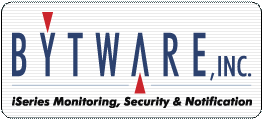In a perfect world, there would be no viruses. In reality, news of viruses increases week after week, and the outlook calls for more targeted and malicious attacks. In the face of such risks, the world's top companies are taking steps to ensure that their systems remain clean and their customers protected.
Manheim, the world's leading provider of automotive services to commercial sellers and automobile dealers, has turned to StandGuard Anti-Virus, the world's first and only native anti-virus solution for the iSeries, to protect its systems.
In addition to offering multiple selling opportunities and a full array of services--including reconditioning, certification, title management, and dealer floor planning--Manheim is also the leading technology provider for the industry, supplying tools that help commercial sellers and dealers to not only manage their businesses but also realize the full value of their vehicles. In short, Manheim impacts every stage of a used vehicle's life cycle. Manheim is a wholly owned subsidiary of Cox Enterprises.
A global organization with 32,000 employees at its 124 worldwide locations and 2002 sales of 5.1 million used vehicles worth more than $54 billion, Manheim requires reliable, battle-tested technology to manage its multiple systems.
The Threat
The issue of viruses residing on the iSeries is not new to Manheim. The company has been attentive to the threat for some time. Unfortunately, the options available prior to the release of StandGuard Anti-Virus required the use of PC-based scanners that were not designed for the iSeries, providing less than adequate coverage.
"Our approach to viruses on the iSeries IFS has been essentially to map a drive to an open share folder, and scan with the PC-based McAfee product," explains Jeff Brooks, a system technician with Manheim. "While we have protection on our network servers and the majority of our PCs, we have not been successful in preventing the proliferation of viruses to write-enabled shares on the iSeries." Another concern that must be addressed when mapping a PC to an open share is the door that it opens to hackers and even to viruses on the scanning PC itself.
In addition to these shortcomings, Brooks found other obstacles to successful PC-based scanning: size and scope. "We have also worked with a dedicated server PC to function only as a scanner, with some success; however, the number of machines we have dictated an alternative."
Native Benefits
That's when Brooks began looking for a better way to protect his systems, particularly with an eye toward efficiency. "We pursued the use of an iSeries native product in order to access the IFS more quickly. Some of our larger shares take 14-17 hours to scan and delete virus files using a PC-based scanner."
StandGuard Anti-Virus is powered by McAfee's top-ranked scanning engine, the same engine used in PC versions of McAfee VirusScan. Since Manheim was already using McAfee's PC solution, they were in a good position to judge the speed benefits of StandGuard Anti-Virus's OS/400-native engine. "We have been running the PC-based McAfee product, and found that the run-times for the native iSeries product were significantly shorter," explains Brooks. In fact, in real-world use, StandGuard Anti-Virus has achieved scanning speeds as high as 25 files per second. The speed on a given scan is influenced by a number of factors, including processor type, number and size of files, and resources allocated.
Speed is not the only benefit that Brooks has found in StandGuard Anti-Virus, adding that "the key advantages to us in using SGAV are the scheduling, code management, native processing, ease-of-use, and processing speed."
Striking the Target
No method, including firewalls and email protection, can keep out all viruses, so the approach must be to remain vigilant in scanning. While many believe that the iSeries is immune and cannot harbor viruses, Brooks holds a different view. "Since the IFS on the iSeries can behave like any network share, we have found that it can pose a number of problems as a host for viruses."
When asked if scans had uncovered any surprises, Brooks cuts to the chase. "We definitely found virus files when we used SGAV. We were not surprised, as we knew they were there; we just needed an efficient way to eradicate them. On most of our systems, we have found several hundred virus files; but, in some cases, we have found thousands."
To date, there have been no reports of a virus affecting OS/400 itself or damaging the iSeries, so does the mere presence of viruses on the IFS really pose a threat? "We have had people click on files in the folders on the iSeries IFS and infect their PCs and others," says Brooks. "We are also starting to see some effect on iSeries disk usage and performance."
With StandGuard Anti-Virus's speed and advanced detection techniques, including heuristic scanning to detect not only known viruses but many that are still unknown, Manheim has finally put an end to this proliferation and performance erosion.
Doing Business with Confidence
Indicating virus prevention and elimination to be one of Manheim's top priorities, Brooks is happy to at last have a native tool in his arsenal. "I have been very impressed with the way SGAV works, and feel confident that the iSeries systems where it is running are not passing viruses across our network." He also adds that "since the implementation of SGAV, we do not have to constantly look at open shares to make sure they are clear of virus files." That in and of itself is a big time-saver.
Manheim scans its major system file shares daily and finds that the implementation of a native solution has increased the security and reliability of its systems, allowing the company to maintain its high standards of automotive services around the world with even greater confidence by keeping viruses in check with StandGuard Anti-Virus.
Christopher Jones is the marketing manager for Bytware, Inc. Prior to joining Bytware, he served as communications manager and editor for a large organization in Tokyo. He writes extensively on a variety of topics.

Bytware, Inc.
9440 Double R Blvd, Suite B
Reno, Nevada 89521-5990
Tel: 775-851-2900 or 800-932-5557
Web: www.bytware.com












 Business users want new applications now. Market and regulatory pressures require faster application updates and delivery into production. Your IBM i developers may be approaching retirement, and you see no sure way to fill their positions with experienced developers. In addition, you may be caught between maintaining your existing applications and the uncertainty of moving to something new.
Business users want new applications now. Market and regulatory pressures require faster application updates and delivery into production. Your IBM i developers may be approaching retirement, and you see no sure way to fill their positions with experienced developers. In addition, you may be caught between maintaining your existing applications and the uncertainty of moving to something new. IT managers hoping to find new IBM i talent are discovering that the pool of experienced RPG programmers and operators or administrators with intimate knowledge of the operating system and the applications that run on it is small. This begs the question: How will you manage the platform that supports such a big part of your business? This guide offers strategies and software suggestions to help you plan IT staffing and resources and smooth the transition after your AS/400 talent retires. Read on to learn:
IT managers hoping to find new IBM i talent are discovering that the pool of experienced RPG programmers and operators or administrators with intimate knowledge of the operating system and the applications that run on it is small. This begs the question: How will you manage the platform that supports such a big part of your business? This guide offers strategies and software suggestions to help you plan IT staffing and resources and smooth the transition after your AS/400 talent retires. Read on to learn:
LATEST COMMENTS
MC Press Online